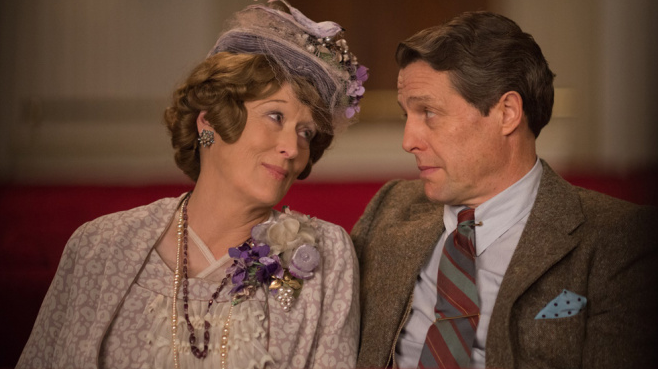
Meryl Streep is famous for her accents, but if there were any justice in the world, she’d be equally famous for her funny singing. You see, Streep’s funny singing is the force that drives Florence Foster Jenkins, where she plays the titular character, quite possibly the worst opera singer in the world. The first time Streep opens her mouth, letting loose those high pitched yawps and squawks and squeals, my audience screamed with laughter. But it’s one thing to do a funny voice bit once—the question is, could Streep sustain that bit, several times, throughout the course of the film? Happily, the actress brings new wrinkles—an ironically beatific facial expression, a herky-jerky dance step, a dying quail melisma—to the awfulness every time. Credit is also due to director Stephen Frears, ever the pro’s pro, who milks the various audience reaction shots—horror, bemusement, uncontrollable laughter—for all they’re worth. (I believe that Simon Helberg, who plays Florence’s put-upon accompanist Cosme McMoon, was cast specifically for his wonderfully rubber face.)
It’s a good thing that Streep, Frears, Helberg, and Hugh Grant—who plays St. Clair Bayfield, Florence’s devoted, if slightly sketchy husband—are all so skilled at what they do, because Florence Foster Jenkins is a peculiar film, one I’m not entirely convinced should’ve been made. It’s based on a true story and you can sense Frears and writer Nicholas Martin trying to dance around the edges of some of the more tragic aspects of Florence’s life to bring us a frothy confection about pursuing your dreams despite the odds.
Florence was a patron of the arts who gave so much money to the symphony, Arturo Toscanini frequently popped in for tea. And because she is so generous, everyone indulges her fantasy that she’s a first-class opera singer. (The assistant conductor of the New York Philharmonic gives her private singing lessons, where he floridly praises her and treats her like a diva.) St. Clair, himself a failed thespian, goes through great lengths to keep the reality of her awfulness from her—paying off critics, cramming her concerts with those who have benefitted from her largesse, buying up an entire newsstand filled with bad reviews. His biggest challenge—and the film’s turning point—is when Florence books herself a gig at Carnegie Hall. Even his best efforts can’t control an audience that large.
All of this would be cute were it not for a few things: St. Clair is actually living with another woman (Rebecca Ferguson), raising the unsavory possibility that he’s only doting on Florence for her money. (The film jumps through hoops to characterize the relationship between Florence and St. Clair as a special kind of platonic love, but can’t shed this awkward detail.) What’s more, Florence is sick with syphilis—she contracted the disease from her ex-husband when she was young and, by all accounts, should be dead already (St. Clair attributes her survival to the power of music). Dementia is one of the symptoms of late-stage syphilis, but the film chooses to depict Florence as merely daffy, kind-hearted, and eccentric.
Against the odds, Florence Foster Jenkins manages to be a funny and even endearing film. But I kept asking myself, what’s it really about? If it’s a love story between St. Clair and Florence, the fact that he’s sleeping with another woman throws a bit of a wrench into that. If it’s a film about chasing your dreams, no matter how far-fetched or delusional they might be—well, I’m not convinced that’s something to be celebrated. Perhaps the most generous way to look at the film is this—Florence was very good to a lot of people so they were good right back. In her case, the answer to that old chestnut, “How do you get to Carnegie Hall?” is “Karma.”
